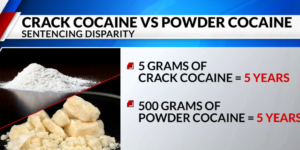Photos: YouTube Screenshots
WASHINGTON — The American Civil Liberties Union, NAACP Legal Defense and Educational Fund, Inc. (LDF), Leadership Conference on Civil and Human Rights, Tzedek Association, Drug Policy Alliance, Sentencing Project, Brennan Center for Justice at NYU Law, Justice Roundtable, Jewish Council for Public Affairs, Multifaith Initiative to End Mass Incarceration, National Council of Churches, American Humanist Association, and Taifa Group are calling on President Joseph R. Biden to grant clemency for people convicted of federal crack offenses.

In a letter sent to President Biden, the organizations write:
“It is unacceptable that we know of glaring injustices in our criminal legal system, but see little action from those with the responsibility to change the law. However, by virtue of the authorities outlined in our Constitution, you have the power of executive clemency to grant pardons and commutations to thousands of people impacted by unjustly punitive crack cocaine sentencing guidelines.”
The result of a moral panic after a promising basketball phenom died of a drug overdose, Congress adopted the 1986 Anti-Drug Abuse Act: a person with a small amount of crack faced the same sentence as a person with 100 times that weight in powder cocaine — even though the two substances are chemically identical. The 100:1 sentencing disparity, as it’s known, combined with over-surveillance and racist enforcement of drug laws devastated Black communities in the United States.
As the ACLU found in a report published almost two decades ago, “As law enforcement focused its efforts on crack offenses, a dramatic shift occurred in the incarceration trends for African Americans, relative to the rest of the nation. This trend effectively transformed federal prisons into institutions increasingly dedicated to incarcerating African Americans.”
Despite strong bipartisan support and President Biden’s support for eliminating the disparity, it remains. The Fair Sentencing Act of 2010 reduced the disparity to 18:1. Last year, Attorney General Merrick Garland instructed prosecutors at the Department of Justice not to automatically charge crack and powder cocaine offenses differently, a temporary remedy for people who will be charged in the future.
Thousands of people are serving out harsh, unjustifiable sentences because of the crack disparity, while thousands of others still face legal discrimination from governments, landlords, and employers because of a criminal record for a federal crack conviction.

“The war on drugs has harmed people, overwhelmingly Black, who have been locked in prison and locked out of opportunity because of criminal records, and families and communities that have been devastated by losing their loved ones to incarceration,” said Cynthia W. Roseberry, acting director of the ACLU’s Justice Division. “But even for those who have never seen the inside of a prison, the war on drugs creates a profound moral injury — making them complicit in a system that perpetuates the oppression of Black people and calls it safety. We are asking President Biden to show moral leadership by granting clemency to people with federal crack convictions. We can chart a course that creates safety and justice for all of us, and it starts with accountability for past wrongs.”
The following statements can be attributed as noted:
Kristina Roth, Senior Policy Associate, Legal Defense Fund:
“For decades, Black communities have been disproportionately surveilled and terrorized by the War on Drugs. This targeted law enforcement attack has resulted in the extended and indefensible incarceration of thousands of Black people.
“We urge President Biden to follow through on his promise to end the crack-cocaine sentencing disparity and exercise his clemency powers to commute the sentences of those who are serving time due to these deeply unjust and racially biased sentencing ratios that Congress has yet to equalize almost 40 years later. While this action cannot return the years that have been taken from people’s lives, it is a critical step to ensuring these individuals are no longer enduring unfair punishment.”
Maritza Perez Medina, Director of the Office of Federal Affairs, Drug Policy Alliance:
“The federal crack and powder cocaine sentencing disparity is one the greatest injustices of our criminal legal system. As a Congressional lawmaker, President Biden was a leader in passing this law and other so-called tough-on-crime policies, the consequences of which still reverberate in communities of color today. Therefore, the President has a moral imperative and responsibility to make it right by granting clemency to our loved ones.”
Lauren-Brooke Eisen, Senior Director of the Justice Program at the Brennan Center for Justice at NYU Law:
“President Biden should use his clemency power to bring an end at last to an injustice that began with the extreme disparity in punishment between powder cocaine and crack cocaine in the Anti-Drug Abuse Act of 1986. Thousands of people remain in federal prison because they were charged under the law’s sentences for crack, which mandated the same sentence for 1 gram of crack cocaine as 100 grams of powder cocaine. That ratio was lowered in 2010 from 100:1 to 18:1, but that’s no help to those imprisoned under the original law because the reform isn’t retroactive.
“The 1986 law drove devastating racial disparities in federal sentencing, and both its ratio and the 2010 ratio lack any scientific justification. The president must step in and allow those still behind bars under the old law to go home.”
Amy Spitalnick, CEO of Jewish Council for Public Affairs:
“Jewish values, and basic human decency, are threatened by the inhumanity of mass incarceration and criminalization – and there are few better illustrations of the racist underpinnings of the failed War on Drugs than this sentencing disparity. There’s broad consensus on the facts. Now it’s crucial that President Biden act by granting clemency to those impacted.”









